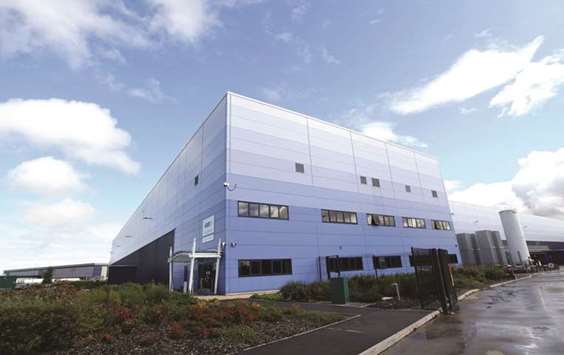GKN Plc rejected an unsolicited approach from Melrose Industries Plc and said it will split itself in two rather than than accept a £7bn ($9.5bn) takeover offer that it says undervalues the UK maker of aerospace and automotive components.
GKN shares surged as much as 28% to an all-time high after the Redditch, England-based company, a key supplier to Airbus SE and Boeing Co, said yesterday that it turned down the 405 pence-a-share offer from Melrose, a UK investment firm that specialises in turnarounds. Melrose said separately that it remains interested in a buyout.
The board and its advisers “concluded that the proposal is entirely opportunistic and that the terms fundamentally undervalue the company and its prospects,” GKN said in a statement.
The offer comes at a delicate time for GKN, which said in November it was firing its incoming chief executive officer before he even started amid mounting write-offs related to a troubled aerospace plant in Alabama. Compounding the upheaval, the UK decision to leave the European Union has clouded the outlook for the country’s autoparts manufacturers because of their reliance on open trade.
In rejecting Melrose’s approach, GKN said interim CEO Anne Stevens, in the job since January 1, will keep the position permanently after taking over an “ongoing and wide-ranging” review of all businesses. The former Ford Motor Co executive, 69, will oversee the planned split, creating two companies with “distinct investment profiles and capital allocation policies,” it said.
GKN traded 26% higher at 419.6 pence as of 10:46am in London, valuing the company at £7.2bn, an indication investors expect a higher offer to emerge. Melrose rose as much as 12%, the most since March 2, and was later up 5.4% at 226.7 pence.
“We believe Melrose would be able to substantially improve the operations and we suspect shareholders would support an increased bid,” Liberum analyst Ben Bourne said in a note to clients.
Melrose said its cash-and-share offer is aimed at reversing GKN management’s history of “not delivering on margin targets,” and improve its businesses before a breakup, enabling them to exceed current profitability goals.
A potential offer would take the form of 80% stock and 20% cash, and current GKN owners would end up with about 57% of the enlarged group, Melrose said. The cash portion of the bid would be financed by debt.
“GKN shareholders would become major participants in this potential future value creation, over and above the attractive immediate premium over the GKN share price,” Melrose said.
The company’s autos unit, which makes drivetrain components, accounts for almost half of sales versus just over a third from aerospace, though the latter generates more profit at 44% of the total. The group also has metallurgy and land-systems divisions.
GKN Timeline
September 14: Appoints Kevin Cummings, head of aerospace, to succeed CEO Nigel Stein at year-end
October 13: GKN announces charges of 55mn pounds, including 15mn from the North American unit that Cummings once ran, after a review. “Frankly, this feels like walking down the street and being mugged,” Stein said at the time
November 16: Cummings leaves GKN with immediate effect after company announces as much as 130mn pounds in further charges. Anne Stevens named as interim CEO
January 1: Stevens takes over after Stein exits
January 8: Melrose submits bid
January 12: GKN rejects Melrose offer, appoints Stevens as permanent CEO, commits to splitting company
GKN confirmed its position as a major supplier of jetliner wing, tail and fuselage components with the purchase of an Airbus plant in Filton, England, in 2008. The factory makes parts for every Airbus plane, including the newest A350 wide-body, guaranteeing years of work.
The aviation arm was further bolstered by the purchase of Volvo AB’s aircraft engine unit for almost $1bn in 2012 and the acquisition of Fokker Technologies Group in 2015, making it the world No 2 in aerostructures behind Wichita, Kansas-based Spirit AeroSystems Holdings Inc, a top Boeing supplier.
Melrose seeks to buy struggling engineering companies or manufacturers and then sell them on once they’ve improved the business. The London-based company, managed by former Wassall Plc executives, counts Gillette razors and wire-rope maker FKI Plc among its prior investments.
The company said August 31 it had been busy exploring potential acquisitions over the summer of 2017. While its current investment in Nortek is delivering returns, Melrose said it’s having to take a deeper dive into former FKI unit Brush because of increased “market challenges.”

GKN’s aerospace factory at Severn Beach, UK (file). The Melrose offer came at a delicate time for GKN, which said in November it was firing its incoming CEO before he even started, amid mounting write-offs related to a troubled aerospace plant in Alabama.
